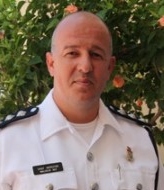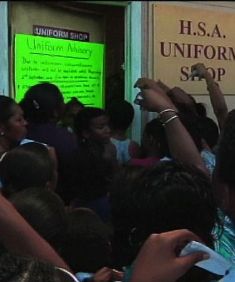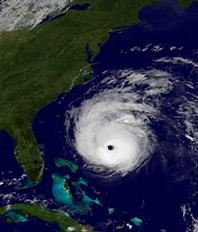Archive for September 3rd, 2010

Crime falling on Cayman Brac
 (CNS): While there is some concern that drug and alcohol abuse is becoming more prevalent, crime figures for Cayman Brac fell this year, the area commander, Chief Inspector Malcolm Kay (left), told residents this week in the last of the current round of RCIPS public meetings. In January through August this year 94 crimes were logged, ranging from assault to burglary, down from 119 crimes for the same period last year (147 for the whole of 2009). Kayspeculated that the rise last year was a result of Hurricane Paloma in November 2008, which resulted in an influx of people to help with the clean-up operations. “I didn’t realize it was that amount,” said Bracker Arlen Reid. I’d like to see that go down.”
(CNS): While there is some concern that drug and alcohol abuse is becoming more prevalent, crime figures for Cayman Brac fell this year, the area commander, Chief Inspector Malcolm Kay (left), told residents this week in the last of the current round of RCIPS public meetings. In January through August this year 94 crimes were logged, ranging from assault to burglary, down from 119 crimes for the same period last year (147 for the whole of 2009). Kayspeculated that the rise last year was a result of Hurricane Paloma in November 2008, which resulted in an influx of people to help with the clean-up operations. “I didn’t realize it was that amount,” said Bracker Arlen Reid. I’d like to see that go down.”
The effects of the hurricane on the people here plus the addition of construction and clean-up workers “bringing their social and driving habits from elsewhere” offered a plausible explanation for the spike in crime last year, Kay said. While the vast majority of offences were traffic related, assault occasioning actual bodily harm was the most serious crime recorded, down from 33 to 22 incidents, the majority of which were domestic disputes, with common assaults down from 13 to just two.
Police Commissioner David Baines said the Sister Islands also had two of the best police stations and the Brac station was the first to be equipped with video equipment for interviewing suspects. He said the recent use of the helicopter to locate missing fishermen at Pickle Bank (a shallow area about 75 miles from Cayman Brac) proved that it could be used in Sister Islands operations.
The commissioner said that the close community spirit on the Sister Islands was something they wanted to recreate on Grand Cayman. However, while the Brac is still a place where people don’t bother to lock their houses, Baines asked people to lock up anyway. “It just takes one offender to ruin it,” he said.
One issue that had been raised in Little Cayman was hurricane preparedness, Baines said and explained that, in case of emergency on the Sister Islands, there were possible plans to have a dedicated team of one inspector and 10 constables ready to drop in and go wherever Kay needed them.
Deputy Premier Juliana O’Connor Connolly, who is the second elected member for the district and sat on the panel with Baines, Kay and Community Affairs Minister Mike Adam, voiced her concern about criminal elements “infiltrating the Brac”, and wondered if there was a way to stop them coming to the island. The DP also noted the rise in alcohol and, to a lesser extent, drug abuse and said there was concern for the young people.
Police staffing on the Brac was down four constables – there are eight currently, who work with Kay and newly promoted Sergeant Ashton Ferguson – and the CoP said that the island would “get its share” when new staff was recruited. A process that is underway to fill 27 of the 85 vacancies: nine new recruits were in training, ten experienced detectives were on their way and the RCIPS was also recruiting from the US, UK, Canada and the Caribbean.
No one had any complaints about current police officers on the Brac, but after hearing about past experiences of rude officers, Baines said he had “no truck with bad attitude”. He said they were bringing people who had had bad experiences with the police into the training sessions for new recruits to explain what it was like so the recruits can understandthe difference attitude makes.
Referring to the RCIPS Oath of Office he said that officers who couldn’t follow that had no place in the service. “If you fail that you fail the community,” he said.

Swiss won’t assist in stolen bank data cases
(Swissinfo): The government of Switzerland has adopted a new ordinance setting out when it will or will not cooperate with other countries requesting assistance in cases of suspected tax crime. In a statement on Wednesday, the government said that requests for administrative assistance would be rejected if they are “based on information which was obtained or forwarded due to actions which are punishable under Swiss law”. Recently, there have been cases of client data stolen from Swiss banks or Swiss branches of foreign banks which were offered to, and in some cases bought by, the authorities in European countries including Germany and France.
The ordinance also forbids assistance to governments in cases of fishing expeditions (where tax authorities trawl for data on the off-chance of uncovering evasion or fraud).
Alibis revealed for accused
(CNS): Both Brandon Leslie-Ebanks and Patrick McField had given the police alibis for their whereabouts at the time Omar Samuels, the man they are accused of murdering, was believed to have been shot, the court heard on Thursday. During the fourth day of the Grand Court trial of Leslie-Ebanks, McField and Osborne Douglas for the murder of Samuels the jury heard from a number of police witnesses, some of whom had interviewed the accused men. Statements taken from the men before and after their arrests revealed they both Leslie-Ebanks and McField had offered up friends and family who could vouch for where they were at the time of the murder and they denied being with each other.

Chaos at school campus as uniform stock falls short
 (CNS): Frustrations were mounting yesterday when literally hundreds of parents and students were forced to queue in the blazing sun in order to try and get uniforms for the new school year. Following a change in uniform for the new high school system but a delay in their delivery, there will not be enough to go round and parents had to take a chance on queuing up at both the John Gray Campus and the civic centre in Bodden Town yesterday in order to get the school clothes. Parents were also angry that education authorities were not keeping them informed about what was happening. Although the minister has apologized he said it is beyond government’s control. (Photo courtesy of News 27).
(CNS): Frustrations were mounting yesterday when literally hundreds of parents and students were forced to queue in the blazing sun in order to try and get uniforms for the new school year. Following a change in uniform for the new high school system but a delay in their delivery, there will not be enough to go round and parents had to take a chance on queuing up at both the John Gray Campus and the civic centre in Bodden Town yesterday in order to get the school clothes. Parents were also angry that education authorities were not keeping them informed about what was happening. Although the minister has apologized he said it is beyond government’s control. (Photo courtesy of News 27).

Rapper spotted “courting” Cayman model
 (Rap-Up.com): Fresh from a split from Amber Rose, Kanye West is back on the romantic playing field. Yeezy cozied up next to Nick Cannon’s ex-fiancé and Victoria’s Secret supermodel Selita Ebanks in a suite inside Arthur Ashe Stadium yesterday (Sept. 1) to watch Andy Roddick play at the U.S. Open in Queens, New York City. The pair, rumoured to have been dating in the past, was all smiles as they sipped lime-spritzed club soda drinks, watching from seats positioned in front of “Gossip Girl” stars Ed Westwick and Jessica Szohr, who shared a laugh with the happy couple.
(Rap-Up.com): Fresh from a split from Amber Rose, Kanye West is back on the romantic playing field. Yeezy cozied up next to Nick Cannon’s ex-fiancé and Victoria’s Secret supermodel Selita Ebanks in a suite inside Arthur Ashe Stadium yesterday (Sept. 1) to watch Andy Roddick play at the U.S. Open in Queens, New York City. The pair, rumoured to have been dating in the past, was all smiles as they sipped lime-spritzed club soda drinks, watching from seats positioned in front of “Gossip Girl” stars Ed Westwick and Jessica Szohr, who shared a laugh with the happy couple.

Gaston fades to a remnant as Earl rolls on
 (CNS): As Gaston, the season’s seventh storm faded away this evening, Earl continued on towards the coast of North Carolina. At 8pm it was located some 160 miles southeast of Cape Hatteras. While winds have dropped some to 110mph, Earl remains a large category two hurricane and it is moving at about 18mph. The NHC said a turn towards the north-northeast with an increase in forward speed is expected on Friday. The centre of Earl is forecast to pass near the North Carolina outer banks tonight and approach south-eastern New England by Friday night.
(CNS): As Gaston, the season’s seventh storm faded away this evening, Earl continued on towards the coast of North Carolina. At 8pm it was located some 160 miles southeast of Cape Hatteras. While winds have dropped some to 110mph, Earl remains a large category two hurricane and it is moving at about 18mph. The NHC said a turn towards the north-northeast with an increase in forward speed is expected on Friday. The centre of Earl is forecast to pass near the North Carolina outer banks tonight and approach south-eastern New England by Friday night.

Charities law faces rewrite
 (CNS): Despite previous plans to bring the Charities Bill to the Legislative Assembly at the next sitting, a statement from the Attorney General’s Office on Thursday evening revealed that the draft bill will be going back to the drawing board as a result of concerns from charities and the public. Sam Bulgin acknowledged that more needed to be done by government to clarify the law to regulate charities, as mandated by Cayman’s international obligations. He said the bill would be revisited for further consultation. The bill would have seen charities charged fees, be required to submit formal accounts and reveal anonymous donors before they could be registered and raise funds.
(CNS): Despite previous plans to bring the Charities Bill to the Legislative Assembly at the next sitting, a statement from the Attorney General’s Office on Thursday evening revealed that the draft bill will be going back to the drawing board as a result of concerns from charities and the public. Sam Bulgin acknowledged that more needed to be done by government to clarify the law to regulate charities, as mandated by Cayman’s international obligations. He said the bill would be revisited for further consultation. The bill would have seen charities charged fees, be required to submit formal accounts and reveal anonymous donors before they could be registered and raise funds.